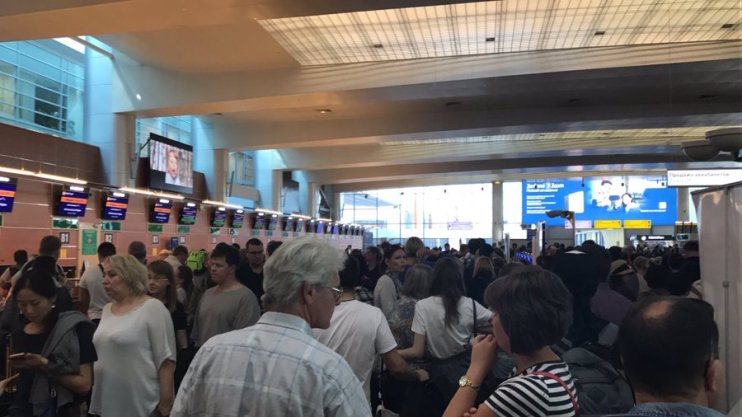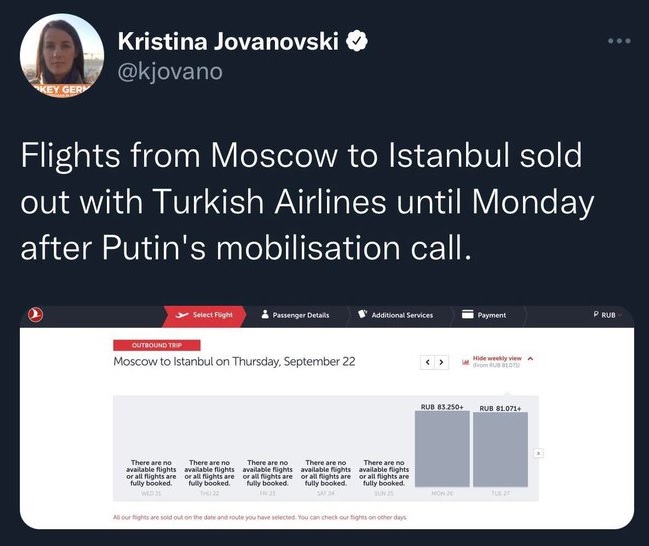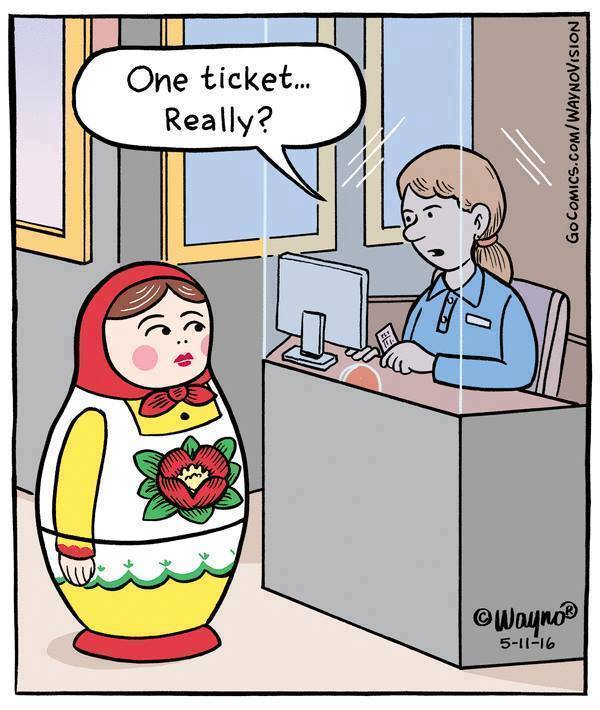Russians flee en masse to escape Putin’s mobilisation with few flights out of Moscow costing £10,000

Tens of thousands of Russians are fleeing their country to escape the mass military mobilisation that is currently underway.
As a result, international flights out of Moscow now cost more than £10,000 per seat for a single ticket.
The Kremlin ordered last week that up to 300,000 reservists across Russia should report for duty in order to assist their country’s army in the war in Ukraine.
Less than a week later, however, ticket prices for a direct flight to most foreign destination have shot up to a staggering £12,000 euros for a single ticket, based on the most recent data from Google Flights.
This morning UK time, a one-way ticket to the Armenian capital of Yerevan is offered for just over £11,000.

The number of available international destinations is fairly limited, however, since neighbouring EU and most Western countries have closed their airspace for flights to and from Russia.
Flights are still available to the Turkish cities of Istanbul, Ankara and Antalya, as well as Dubai and several cities in central Asia.
Land borders with Finland, Armenia, Georgia and Mongolia
In addition to a run on plane tickets, Russians and local media also report long queues at Russia’s land borders with Finland, Armenia and Georgia.
Waiting times at the border with Russia were reportedly up to 48 hours yesterday. Georgia and Armenia are particularly popular since Russian citizens do not need a visa to enter these countries.
In addition, Finnish border authorities have reportedly said that around 17,000 Russians have crossed the border since last week, much more than during a normal week.
Finally, local media in Mongolia also reported long queues at the country’s border crossings with Russia.
There are reports in Eastern European and Russian media the Kremlin has decided to close all its borders as soon as today or tomorrow morning, formally for security reasons.
Military mobilisation
Last week, the Russian president announced a partial military mobilisation, with 300,000 reservists set to be called up as the Kremlin attempts to regain ground in the face of a counter-attack by Ukraine’s forces.
Vladimir Putin warned Russia would use “all the means at our disposal” to protect itself as the conflict in Ukraine threatened to spiral into a nuclear crisis.
Putin stressed “it’s not a bluff” when he vowed that Russia would use its weapons of mass destruction if its territory was threatened.
The Russian leader accused the West of “nuclear blackmail” and claimed “high-ranking representatives of the leading Nato states” had talked about the possibility of using weapons of mass destruction against Russia.
“To those who allow themselves such statements regarding Russia, I want to remind you that our country also has various means of destruction.”
Russian President Vladimir Putin
Moscow-controlled regions in eastern and southern Ukraine are set to hold referendums on becoming parts of Russia, which could give the Kremlin the pretext for a wider war because Putin would be able to claim parts of his state were being attacked.
The UK’s Defence Secretary Ben Wallace said last week that Putin’s actions were “an admission that his invasion is failing”.
“No amount of threats and propaganda can hide the fact that Ukraine is winning this war, the international community are united and Russia is becoming a global pariah.”

‘Biden’s Crazy behaviour’
A former adviser to Putin has suggested the Russian leader would be ready to use nuclear weapons against Western nations such as the UK.
Political scientist Sergei Markov said last week that it “could kill a lot of people in the Western countries”.
“This nuclear war could be a result of the crazy behaviour of the president of the United States Joe Biden and prime minister of Great Britain Liz Truss.”
Sergei Markov
A British defence intelligence update suggested Putin was being forced to undermine his own public position that the war in Ukraine was a “special military operation” rather than a full-scale conflict.
“These new measures have highly likely been brought forwards due to public criticism and mark a further development in Russia’s strategy,” the Ministry of Defence said.
“Putin is accepting greater political risk by undermining the fiction that Russia is neither in a war nor a national crisis in the hope of generating more combat power,” the note read.
UK Foreign Office minister Gillian Keegan went even further, questioning whether Putin was still “in control”.
She told various UK news channels last week: “Some of the language there was quite concerning at the end and obviously we would urge for calm.”
The Chichester member of parliament also said: “It’s something that we should take very seriously because, you know, we’re not in control.
“I’m not sure Putin is in control either, really. I mean, this is obviously an escalation and, of course, for the Russian people now they will be conscripted into this war.”
Foreign Office minister Gillian Keegan
Melinda Simmons, the UK’s ambassador in Kyiv, said Putin’s “essential weakness” was “he still refuses to understand Ukraine”.
Kremlin coup threats
Meanwhile, the Kremlin seems increasingly unsure what to do with growing calls and efforts to remove Putin.
A range of prominent and well-known Russians started calling in recent weeks for the removal of the country’s head of state as the invasion into Ukraine is increasingly turning into a disaster.
What complicates the issue is that it’s not merely anti-Kremlin voices who question the country’s leadership.
In fact, one of Putin’s staunchest allies, Chechen leader Ramzan Kadyrov, a Kremlin loyalist, has criticised the Russian Army’s performance in Ukraine following a humiliating defeat in Izyum last weekend, seen as a critical supply hub in Ukraine’s eastern Kharkiv region.
In an 11-minute message posted on Telegram last week, Kadyrov concluded the invasion is not going to plan and he may feel forced to lecture Putin on what is not going well.
“If changes are not made in the conduct of the special military operation, I will be forced to go to the country’s leadership to explain to them the situation on the ground.”
Kremlin loyalist Ramzan Kadyrov on Telegram
“I’m not a strategist like those in the defence ministry. But it’s clear that mistakes were made. I think they will draw a few conclusions,” newspaper Novaya Gazeta Europe quoted him as saying.
Kadyrov’s statements are a humiliating blow to Putin: Criticism of the ‘special operation’ in Ukraine is not permitted. Dozens of journalists, lawyers and other individuals who dared to question or criticise the invasion have been arrested in recent months.
Calls to oust Putin
Kadyrov’s Kremlin criticism came only a day after a number of local Russian lawmakers – in Moscow and Putin’s home city of St. Petersburg – called for the removed of Putin.
The municipal deputies from the Smolninsky District Council in St. Petersburg wrote on Twitter last week that Russia’s parliament should remove Putin and charge him with high treason for launching the war in Ukraine.
St. Petersburg-based Deputy Dmitry Palyuga tweeted that the decision by President Putin to start the so-called “special military operation is detrimental to the security of Russia and its citizens.”
“The Council of the Smolninskoye Municipal District decided to appeal to the State Duma deputies with a proposal to bring charges of treason against President Putin in order to remove him from office,” Palyuga wrote in a tweet, adding that “the decision was supported by the majority of the deputies present.”
Lawmakers face the law
Following their statement, police have informed the lawmakers they face legal charges and potentially prosecution as their moves are “discrediting the current Russian government,” the Washington Post reported.
In addition, local lawmakers from a municipal council in Moscow’s Lomonosovsky borough made similar statements, urging Putin to resign and retire.
“The rhetoric you and your subordinates have used for a long time is imbued with intolerance and aggression, which in the end has effectively sent our country back into the Cold War era,” the Moscow councillors wrote in a statement, according to a report by the Latvia-based investigative magazine The Insider.
“Russia is once again feared and hated, and we are once again threatening the world with nuclear weapons.”
Lawmakers from a municipal council in Moscow’s Lomonosovsky borough
“In view of the above, we ask that you resign from your post, since your views and your model of government are hopelessly outdated and hinder the development of Russia and its human potential.”
Crackdown
Days after the invasion into Ukraine began, in late February, Putin signed a decree which makes it illegal for Russians to spread so-called “fake news” about the Russian military, government or other public bodies.
Those who are found guilty face prison terms of up to 15 years.
Those who have dared to speak out have been arrested and some have disappeared or died in a mysterious way.
Last month, the head of Russia’s biggest privately held oil producer, who criticised the Kremlin’s invasion of Ukraine, died after reportedly falling out of a hospital window.
Ravil Maganov, chair of the board of LUKOIL, died this week in mysterious circumstances, according to Russian-language site Interfax.
The company is the biggest privately held oil producer in the country, and in March openly criticised Vladimir Putin’s invasion of Ukraine.
Role of FSB and generals
Rumours about attempts or calls to remove Putin are not new.
Earlier this year, in May, rumours were flying that a number of former generals and KGB officials was preparing to oust Putin and plan to end the war in Ukraine, which is increasingly seen across Russia as a strategic mistake and, above all, an economic disaster.

The top of Putin’s former employer – the Russian security service FSB – is said to be so frustrated about the lack of military progress in Ukraine that it has reached out to a number of generals and former army officials, according to various analysts and local media reports.
In particular a group called the ‘Siloviki’ – which comprises of former FSB officers who are active in Russian politics – is said to be pushing hard to replace Putin, together with former officers from the GRU, KGB and FSO, other Russian intelligence units.
Social media
The idea a coup may be increasingly likely is further strengthened by social media activity across Russia and Eastern Europe, which has gone into overdrive in recent weeks.
Moreover, analysts in and outside Russia have said all signs are there that Putin will face a coup soon.
The Russian president is reportedly “very worried” and has tightened security in and around the Kremlin.
“Does it matter? It matters a lot,” said Russian security expert Andrei Soldatov told The Center for European Policy Analysis.
“This is the very first time the Siloviki are putting distance between themselves and the President. Which opens up all sorts of possibilities.”
Russian security expert Andrei Soldatov
“The Russian President has been bracing for a coup for some time as he faces fierce criticism over his “special operation” in Ukraine and he has purged around 150 of his spies over the constant failures,” Soldatov explained.
Moreover, rumours about Putin’s health refuse to die down. On a number of videos the Russian president looks tired, worn out and irritated.
Tensions between Kremlin and FSB
Whether any genuine coup attempt is being prepared cannot be verified, but it has become evident that the relationship between the FSB and Putin has deteriorated since the start of the war.
In April, two senior officers in the FB, were put under house arrest by Putin.
Andrei Soldatov who runs, the well-informed investigative website Agentura, reported that Sergei Beseda, the head of the Fifth Service – the FSB’s foreign intelligence branch – and his deputy had been detained and put under house arrest.
The move was seen as a clear sign Putin is deeply concerned about the FSB’s role in the offensive against Ukraine and he fears forces within the intelligence apparatus may be working against him, Western officials told the Agentura platform.
“Both men have played a major role in intelligence operations against Ukraine for several years and highly likely played a major role in the planning for the invasion,” one Western diplomat said.
“There could be significant changes at senior levels in the FSB.”
Russian analyst Alexey Muraviev is also convinced that the Russian President may be facing a coup from his top military and intelligence chiefs soon.
Muraviev told Sky News Australia recently that an attempt to remove Putin may be extremely likely because “I think that there have been tensions between Russia and the intelligence community and Russia’s President Vladimir Putin.”
“There’s been a clear error of judgment and it was driven by Putin himself about the situation in Ukraine.”
Russian analyst Alexey Muraviev
“I think that sort of false narrative was presented to them by the Supreme Commander in Chief, and when it fired back when the Russians began taking heavy casualties, Putin began quietly blaming the security services,” he continued.
“I don’t think went really well also because he’s coming from within the security apparatus.”
“About the initial planning and the initial phase of the invasion where the Russian military naturally assume that they’re going there as liberators rather than the invaders,” he explained.
When approached by City A.M., today no one at the Kremlin or the Russian Foreign Ministry available to comment.
The Russian Embassy in London declined to comment.